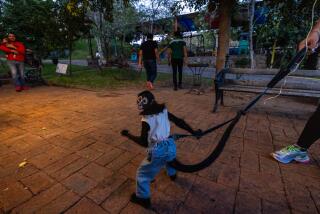Charmers May Leave Their Snakes, Join World : Nomads: Shapurias feel the call of change and modern life.
- Share via
PORABARI, Bangladesh — A deadly cobra hisses menacingly from a half-open basket. Nearby an infant, hardly a year old, plays with a young python as women doze unperturbed in the sun and children sit entranced by mystic songs.
In this village, snake charming and a nomadic existence have been ways of life for decades, but now the snake charmers feel the call of change and modern society.
“This is our life--deadly serpents, numerous children and absolute relaxation,” said Mohammad Azizur Rahman, leader of the Porabari community of snake charmers, called Shapurias.
The 49-year-old man has 20 grandchildren from three daughters and a son.
“I am worried for them, not for food or living, but for bringing them out of their nomadic heritage,” he said.
Rahman said 5,000 snake charmers have settled in in this village 25 miles north of Dhaka in the last several decades, but fewer than 200 have gone to school.
Some of them work in government and private offices. Most community members are Moslems, but they still follow their nomadic system of justice and social laws.
“None of us has ever sought help from the police or public laws,” Rahman said. “We hand down severe punishment to those hurting our social values or morality.”
He added that his people are very liberal about love and marriage. “This is a matter for a boy and a girl to decide if they would live together and bind each other in love.
“But we never forgive one who betrays a woman. His punishment could be anything short of death.”
Aftabuddin Ahmed, a Bangladesh government employee from nearby Savar village, said: “The winds of reform have yet to pervade the entire 150,000 Shapuria community. Perhaps it would take centuries more.”
Ahmed is one of the few people outside the Shapuria community who has married a female snake-charmer.
“It all happened after a long love affair,” he said.
It is unusual for the Shapuria to live in villages because, Ahmed said, most of the Shapurias still live in convoys of boats sailing down the country’s vast network of rivers.
The people from the snake village go out into the cities and collect money by entertaining. As the men play their flutes, their women and the snakes swing and dance together in a terrifying, eerie duet that draws big crowds.
The snake charmers tell their audience about magic charms to revive people bitten by snakes and to keep evil from young girls.
They also sell talismans to mend broken love or for a change of heart.
Back in their homes, little children play with snakes--anything from lethal cobras to less dangerous green-and-yellow grass vipers--tossing their heads and wrapping them around their bodies.
Their parents catch the dangerous reptiles with their bare hands. After a few days of taming, the snakes glide, swerve and dart around the entertainers, to the amazement of onlookers.
Snake-charming women enjoy a reputation for their beauty, fearlessness and mysterious medical powers. But they are often very helpless in their homes.
Wife-beating is so common among the Shapurias that custom dictates that each floating home should have at least one small room where women are safe from abuse.
“It’s very sad and undesirable, because the women usually perform the central role in earning bread for their families,” said Mohammad Harun, an elderly Shapuria.
The women set off every morning to visit scattered rural communities, sometimes walking long distances, while the men stand by the boats--feeding the snakes, taking care of the children or doing other housework.
Each show lasts an hour or so, opening with a tune on a fat-belly wooden flute--ostensibly to wake up the snakes in their bamboo baskets, but more probably to attract an audience.
The charmers, moving sinuously, approach the baskets and lift their lids. The snakes emerge, apparently mesmerized by the sound of the flute. Songs and stories follow.
Rahman said they no longer want to be ostracized by other Bangladeshi people.
“We have lived long enough as gypsies, pursuing a nomadic life and letting our children sleep beside a basketful of snakes. But we are tired of being aloof from rest of the society.
“We now understand the merits of a small family and are learning how to use family planning devices,” Rahman said, gesturing to his many poorly clothed grandchildren.
But they need help if they are to join modern society, he said.
“You can’t ask people to change without offering them an alternative,” he said. “If they have money, jobs and other help, I am sure they will one day all come onshore, permanently.”
More to Read
Sign up for Essential California
The most important California stories and recommendations in your inbox every morning.
You may occasionally receive promotional content from the Los Angeles Times.













